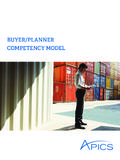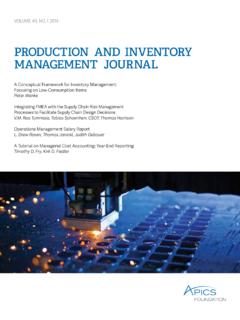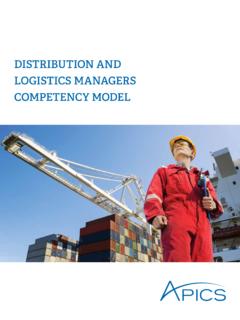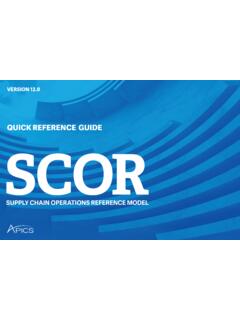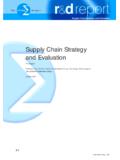Transcription of SUPPLY CHAIN STRATEGY REPORT - APICS
1 SUPPLY CHAIN STRATEGY REPORTMAKE THE MOST OF SUPPLY CHAIN STRATEGYAPICS INSIGHTS AND INNOVATIONSThis APICS REPORT is your guide to understanding, developing and advancing SUPPLY CHAIN STRATEGY . It includes groundbreaking research, a case study and practical how-to tips, as well as pertinent articles reprinted from the APICS magazine. APICS sought to examine the role that SUPPLY CHAIN STRATEGY plays in organizations, and in 2011, the APICS research department conducted a survey of more than 9,000 operations management professionals on the topic of SUPPLY CHAIN STRATEGY .
2 The survey was designed to reveal challenges and identify ways senior management and operations management can better work together to achieve their goals. The survey results reflect an approximately 5 percent margin of error at a 95 percent confidence level. This REPORT was developed by APICS SUPPLY CHAIN Council, an organization that advances SUPPLY CHAIN and operations management and innovation through research, education and publications. APICS SCC maintains the SUPPLY CHAIN Operations Reference (SCOR) model, the SUPPLY CHAIN management community s most widely accepted framework for evaluating and comparing SUPPLY CHAIN activities and performance.
3 For more information, visit APICS SCC research reports are based on practitioner surveys that explore trending topics in SUPPLY CHAIN and operations management. They include survey results, analysis, tips and best practices to keep you and your organization informed of insights and innovations in SUPPLY CHAIN and operations THIS REPORTAPICS INSIGHTS AND INNOVATIONS SUPPLY CHAIN STRATEGY3 TABLE OF CONTENTSE xecutive Summary 5 APICS Research 20A full version of this REPORT is available free to APICS SUPPLY CHAIN Council affiliates and sponsors and APICS members.
4 Log in to the website to access additional analysis and insights on this topic. If you aren t an APICS member, join APICS today. Nonmembers may also purchase the full REPORT . Visit for information about becoming a corporate affiliate or CHAIN STRATEGY REPORTMAKE THE MOST OF SUPPLY CHAIN STRATEGYA dditional Resources These programs and publications provide resources and detailed information about the topic. APICS Risk Management Certificate INSIGHTS AND INNOVATIONS4 SUPPLY CHAIN STRATEGY REPORTMAKE THE MOST OF SUPPLY CHAIN STRATEGYAPICS POINT OF VIEWS trategy:According to the APICS Dictionary, 14th Edition, The STRATEGY of an enterprise identifies how a company will function in its environment.
5 The STRATEGY specifies how to satisfy customers, how to grow the business, how to compete in its environment, how to manage the organization and develop capabilities within the business, and how to achieve financial objectives. SUPPLY CHAIN STRATEGY5 EXECUTIVE SUMMARYIn June and July 2011, the APICS research department conducted a survey of more than 9,000 operations management professionals on the topic of SUPPLY CHAIN STRATEGY . The results revealed several significant in SUPPLY CHAIN STRATEGY remains relatively low: Current SUPPLY CHAIN strategies are still fairly new.
6 Most respondents REPORT that their current SUPPLY CHAIN STRATEGY was adopted within the last two years (33 percent), or within the past three to five years (30 percent) Most people do not perceive a difference between SUPPLY CHAIN STRATEGY and SUPPLY CHAIN management (58 percent) Managers often fail to explain major changes to the SUPPLY CHAIN in terms of either SUPPLY CHAIN STRATEGY or tactics (30 percent responded sometimes, 23 percent said rarely, and percent said never) Many professionals don t view the SUPPLY CHAIN as a genuine competitive advantage (52 responded no or not sure )Operations Managers are Essential for Advancing MaturityThe majority of operations management professionals taking part in the survey are aware of the organizational STRATEGY and mission statement of their organizations (73 percent).
7 The majority of operations management professionals surveyed have confidence in their skill and experience. On a scale of one to 10, with 10 noting very high confidence, respondents indicated confidence levels between seven and eight (44 percent) and confidence levels between nine and 10 (18 percent). However, 38 percent of survey respondents rated themselves between one and managers know where the SUPPLY CHAIN is more aligned, less aligned, or neutral with respect to organizational or business unit STRATEGY . For example, respondents indicated that customer service (71 percent) and product quality (72 percent) are relatively more aligned with STRATEGY .
8 However, the degree of asset utilization (66 percent), IT systems and platforms (64 percent) and cycle time (59 percent) were neutral or relatively less aligned with STRATEGY . As SUPPLY CHAIN STRATEGY maturity increases, all aspects of the business need to become increasingly aligned. But achieving such alignment requires diligent INSIGHTS AND INNOVATIONS6 Yes, we have the same or similar job role or title at my organizationNo, we don t have any specific SUPPLY CHAIN job role or titleHow often do you refer to organizational or business unit SUPPLY CHAIN STRATEGY when making SUPPLY CHAIN recommendations or working with SUPPLY CHAIN partners?
9 A Baseline for Maturity in SUPPLY CHAIN StrategyThe majority of respondents (40 percent) indicated they usually refer to organizational or business unit SUPPLY CHAIN STRATEGY when making SUPPLY CHAIN recommendations or working with SUPPLY CHAIN partners (14 percent responded always, 27 percent said sometimes , and 13 percent replied rarely ).Organizations with job roles specifically related to SUPPLY CHAIN STRATEGY refer to organizational or business unit SUPPLY CHAIN STRATEGY when making SUPPLY CHAIN recommendations or working with partners. Organizations with such job roles tend to show a higher degree of SUPPLY CHAIN STRATEGY maturity.
10 While larger organizations are more likely to have jobs related to STRATEGY , this trend is not yet the pressing needs of tactical SUPPLY CHAIN operation, organizations may require the creation of a job function dedicated to the execution of SUPPLY CHAIN STRATEGY , rather than a role devoted to SUPPLY CHAIN STRATEGY continues to evolve, the choices operations management professionals need to make to implement it at the tactical level will become more and more important.


